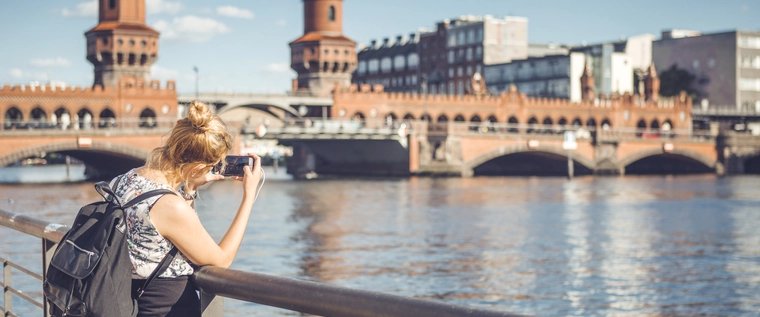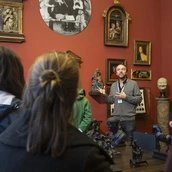
In Kafka's footsteps in Berlin
Franz Kafka's relationship with Berlin was characterized by fascination, curiosity, and ultimately love. It was his first engagement to Felice Bauer, who inspired him to visit Berlin several times in the 1910s.
Later, he fell in love with Dora Diamant, who worked at the Jewish People's Home in Berlin's Scheunenviertel district. Dora was a Jew from Poland, from a Hasidic family, who had moved to Berlin to pursue her dream of a career as an actress. In September 1923, already seriously ill with tuberculosis, Kafka also moved to Berlin for her and spent part of his last year there.
Together they attended courses at the renowned Academy for the Science of Judaism, just around the corner from the New Synagogue. Kafka described the school as "a place of peace in wild Berlin and in the wild regions of the interior."
The "wild Berlin" that Kafka encountered was plagued by political and economic crises. Antisemitism spread throughout many parts of society; the inflation crisis reached its peak. The pogrom against the Jewish population in the Scheunenviertel district broke out on November 5, 1923.
But this Berlin was also home to a dynamic Jewish civil society that, despite (or perhaps precisely because of) its own political and religious divisions, boasted enormous cultural achievements, including Yiddish theaters, academic colleges, Hasidic prayer rooms, and numerous political and cultural associations.
On the 100th anniversary of Franz Kafka's death, participants will embark on a search for Jewish Berlin in the 1920s, which was also Kafka's home for a short time.
Meeting point:
In front of the entrance to the New Synagogue – Oranienburger Str. 28-30, 10117 Berlin
Registration: info@centrumjudaicum.de
(IN GERMAN)
Dates
June 2025
| Mo | Tu | We | Th | Fr | Sa | Su |
|---|---|---|---|---|---|---|
1
| ||||||
2
|
3
|
4
|
5
|
6
|
7
|
8
|
9
|
10
|
11
|
12
|
13
|
14
|
15
|
16
|
17
|
18
|
19
|
20
|
21
|
22
|
23
|
24
|
25
|
26
|
27
|
28
|
29
|
30
|


